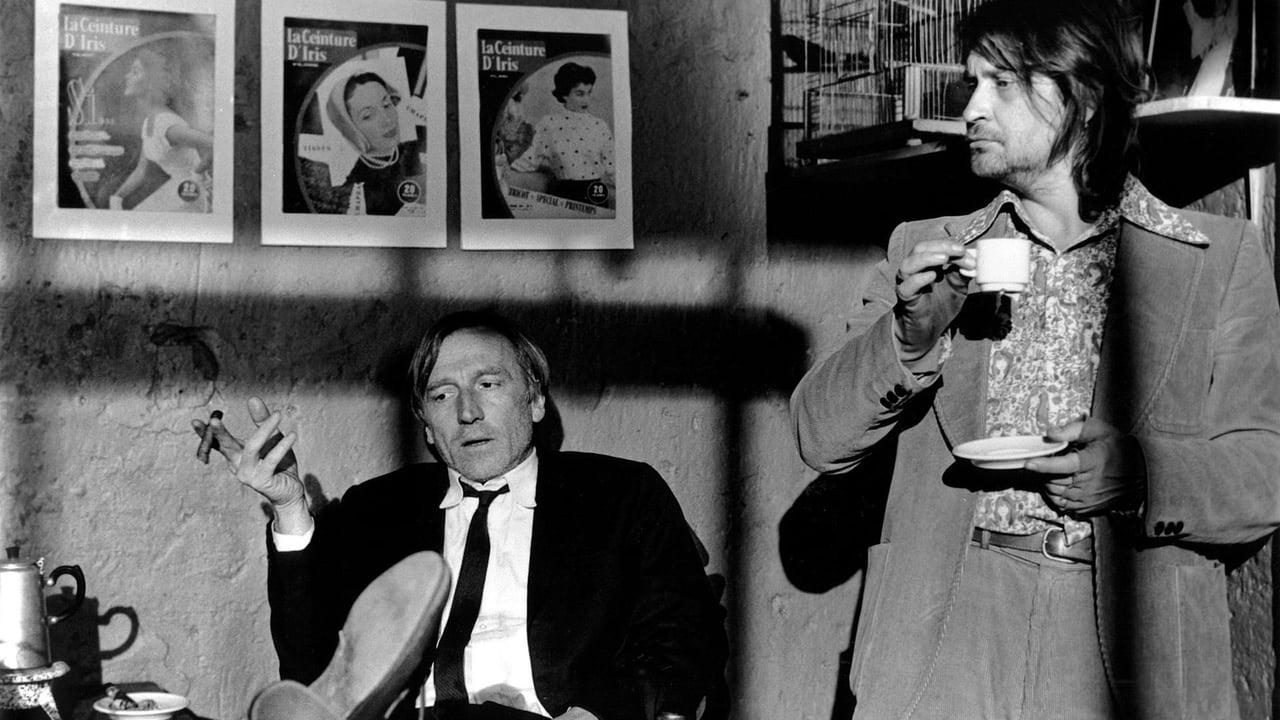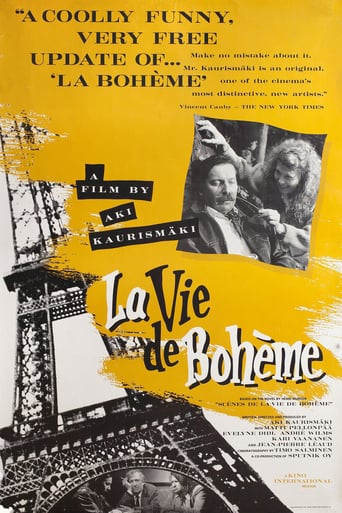

That was an excellent one.
... View Moreridiculous rating
... View MoreOne of the best films i have seen
... View MoreOk... Let's be honest. It cannot be the best movie but is quite enjoyable. The movie has the potential to develop a great plot for future movies
... View Morethe movie is about three scoundrelly, starving, yet genuine artists. i loved the acting, rudolfo in particular is perfect to the T, and story of the 3 artists, since i felt i could identify with them, being a poor, un-understood writer/artist myself (yeah i know one among many thousands, but that does not detract). the movie is not too ham handed about this aspect and keeps the first part of the film very lively, with loves and adventures galore. the second part is slightly more serious what with an unexpected ending. the movie did not have the tight ending and core cohesiveness that is required of masterpieces. part of it may be that it is adapted from a book written in 1888, henri munger's - Scenes de la Boheme. by the way the director is flemish!!! highly amusing, the men seem hip to the scene and even when forlorn are in a trendy down-trodden people's bar (without the street thugs/drunks), cigarette's dangling perpetually from their mouths. the black and white cinematography and overall style of visual composition is spot on. the scene where the musician plays his "original" composition is a hoot. i HIGHLY recommend it.
... View MoreAki Kaurismäki's third literary adaptation, Bohemian Life, may also be his best. Crime and Punishment was brilliantly made (and, remarkably, that was his directorial debut) and Juha is a masterful tragedy, not to mention a magnificent revival of the silent film. As for Hamlet Goes Business, the conclusion was a little overdone, but overall it remains an interesting version of Shakespeare's play. But it's in Bohemian Life, based on Henri Murger's story collection, that Kaurismäki's passion for the subject is felt the most. He always wanted to make this film, and when he finally did the result was wonderful.Beautifully shot in black and white, the film explores the intertwined lives of three artists living in Paris: a French playwright, Marcel Marx (André Wilms), an Irish composer, Schaunard (Kari Väänänen), and an Albanian painter, Rodolfo (Matti Pellonpää). Together, they struggle to maintain a certain decency in their lives, whether that involves tricking their landlord or using a customer's (Jean-Pierre Léaud, grandiose as Rodolfo's portrait model) jacket for a couple of hours without the latter noticing anything. They don't demand much, in fact their friendship is more than enough to ensure life goes on fairly well.At this point, a new character appears: Mimi (Evelyne Didi), a barmaid. Rodolfo falls in love with her, and from there on, things begin to change, and not for the best: the Albanian is sent back home, and when he returns, six months later, everything's different. Can old bonds be restored? Can the situation go back to the way it was? Kaurismäki takes his time to make us acquainted with his characters (hence the unusually long running time - most of his films run to 70 minutes, 80 tops; this one is 100 minutes long), and that's why the movie hits us hard when it has to: having followed their combined fates since the beginning, we have the feeling that we know them, a fact that contributes to making the sucker-punch epilogue even more devastating.The three bohemians are humble but nice people: the simplicity of their lifestyle makes us connect with them on a visceral level, cheering for them when life's good and crying when it suddenly turns bad. Pellonpää, in particular, gives the performance of a lifetime (alongside Shadows in Paradise), his brooding yet incredibly sweet Rodolfo being the heart and soul of this movie (most unforgettable moment, upon being asked by Mimi to be an Albanian gentleman: "Gentleman, no. Albanian, yes").Bohemian Life represents a successful transfer of Finnish mentality and attitudes to a timeless Paris: you never stop and think there's something that doesn't belong there. It's all so perfect, in its sad and happy moments, and Kaurismäki can be very proud of the film he considers to be his favorite.
... View MoreAlthough Aki Kaurismaki credits Henri Murger's collection of stories as the source for his "La vie de boheme" (1992), the underlying dramatic structure actually comes straight from Puccini's opera "La boheme" (with the central focus of the story of Rodolphe and Mimi). Superb black and white photography, with a droll script delivered by mostly dead-pan (but nonetheless funny) performers -- including beloved regulars like the late Matti Pellonpaa and Kari Vaananen (Kati Outinen, a very appropriate Mimi I would think, was missing, however -- maybe her French was not good enough).
... View MoreA French playwright, an Albanian painter, and an Irish composer, all living hand-to-mouth in Paris, devise various schemes to secure their next meal, or cheat the landlord, or help each other out of jams. Cynically witty and poignant by turns, La Vie de Boheme somehow manages to simultaneously embellish and skewer the old cliche about starving artists on the Left Bank. This might almost be the film to show your son or daughter when they have declared that they want to become a novelist or painter and move to an exotic locale--except that, who knows, it might have the opposite of the intended effect.I liked it quite a bit. Watch for the performance by the Irishman of his own piano piece for his friends, toward the end: hilarious!
... View More